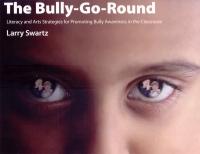| ________________
CM . . .
. Volume XIX Number 36. . . .May 17, 2013 
 |
The Bully-Go-Round: Literacy and Arts Strategies for Promoting Bully Awareness in the Classroom.
Larry Swartz.
Markham, ON: Pembroke, 2012.
30 pp., stapled, $12.95.
ISBN 978-1-55138-285-2.
Subject Headings:
Bullying-Prevention-Study and teaching.
Bullying in schools-Prevention.
Language arts-Correlation with content subjects.
Teacher Resource: Grades 3-12.
Review by Betty Klassen.
*** /4
|
| |
|

excerpt:
No single activity can change someone’s behavior or attitude. When we implement literacy and arts approaches in the classroom, we invite students to connect, react, and respond to stories and information about issues and important events. As the complex issue of bullying continues to spin around the relationships of young people, we need to work toward a better understanding of it. We need to gain insight into why the bully behaves the way he or she does and to recognize that this person is capable of showing positive actions. We also need to investigate strategies to prepare ourselves for being caught in the triangle of the bully, the bullied, and the bystander.
This short flip style booklet tackles a huge ongoing problem in our society and provides a starting point and some ideas for teachers in grades 3-12. This booklet is divided into seven sections, the first of which, “Understanding Bullying”, involves students in a think-pair-share activity to define bullying and then to connect it to student experience and knowledge. Students are invited to participate in a variety of interactive activities that increase their awareness of the pervasiveness of this problem and hopefully empower them to respond in assertive and supportive ways. The included statistics are sobering for teachers and students alike. For example, “71% of teachers say they intervene in bullying episodes; 25% of students say teachers intervene.” (Pepler & Craig, 2000)
Section 2 focuses on bullying in the digital world, introducing students to the tragedy of “bullycide” and a few quotes from the recent teen suicides of Jamie Hubley (October 14, 2011), Jamey Rodemeyer (September 18, 2011) and Amanda Todd (October 12, 2012).
Section 3 provides a resource list of 90 book titles from teacher read-alouds for young children to novels and films for older teens. While the back of the booklet states it is useful for grades 1-12, all of the suggested activities require a significant amount of writing and reading; therefore, the list of read-aloud and picture books would be the most useful section for teachers of very young children.
Other sections suggest ways to respond in role using writing (narrative, poetry, scripts), drama, and art. Suggested resources and scenarios provide a starting point for activities. While the activity descriptions are concise, they are detailed enough to follow easily, and many include one or two extension activities. One exception to this is the short list of play scripts which provides only the authors and titles. Additional online research is needed to locate the sources and summaries to determine whether or not one of the plays is appropriate for your age group of children.
The final section focuses on anti-bullying strategies that address potential situations in schools and online. Ten websites; a mix of student and teacher resource sites, are also listed. A variety of plausible ideas for supporting student awareness of bullying by organizing school-wide and community events are outlined. The final page provides a list of 26 books for professional reading. This booklet can supplement the websites and resources Departments of Education in every province and territory also offer to teachers.
Larry Swartz has written a succinct and practical resource that could empower educators and their students to find ways to better understand and respond to bullying. Swartz brings considerable experience in literacy education to the writing of this booklet, providing a readily accessible resource for a serious relationship and public health issue facing too many of our children.
Recommended.
Betty Klassen teaches in the Middle Years Program in the Faculty of Education at the University of Manitoba in Winnipeg, MB.

To comment
on this title or this review, send mail to cm@umanitoba.ca.
Copyright © the Manitoba Library Association. Reproduction for personal
use is permitted only if this copyright notice is maintained. Any
other reproduction is prohibited without permission.
NEXT REVIEW |
TABLE OF CONTENTS FOR THIS ISSUE
- May 17, 2013.
AUTHORS |
TITLES |
MEDIA REVIEWS |
PROFILES |
BACK ISSUES |
SEARCH |
CMARCHIVE |
HOME |
